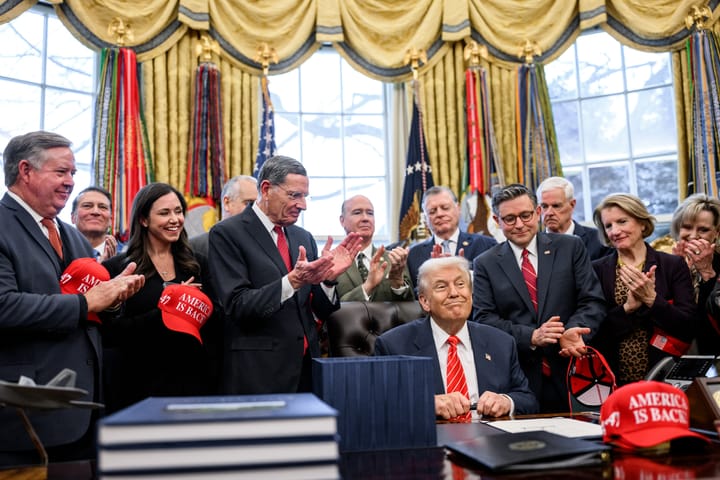This 2019 post was co-authored by Eleanor Eagan, research assistant, and Jeff Hauser, founder and executive director of the Revolving Door Project.
If there is any silver lining to the disastrous Trump presidency, it is that his administration’s epic corruption could compel us to address the gaping deficiencies in our ethics laws and enforcement system. House Democrats, aware that revulsion at Trump fueled the wave that returned them to the majority, made rehabilitating that system the topic of their first bill, H.R.1. And indeed, the “For the People Act” will be getting a vote this week.
That these reforms are in response to this administration’s particularly egregious forms of corruption, however, may be why lawmakers fail to address fully some corruption that flourished long before Trump took office. H.R.1 is a significant and admirable first step towards rehabilitating our politics, but the people will not have reclaimed our democracy completely until we address the revolving door scourge fully.
What do we mean by the “revolving door” problem? Well, consider how the Administrator of the Environmental Protection Agency, Andrew Wheeler, used to lobby that agency on behalf of America’s worst polluters. And Trump’s Comptroller of the Currency, Joseph Otting—who has a temporary side hustle as Acting Director of the Federal Housing Finance Agency—is using his public office to pursue an assault on the policies and institutions he transgressed in the private sector.
To understand the power of the revolving door, however, one shouldn’t merely focus on any of the obvious Trump Administration villains. (and there are oh so many more)
Instead of proudly corrupt individuals happy to serve corporate interests overtly like Wheeler and Otting, consider the examples of Chai Feldblum and Mignon Clyburn. Feldblum and Clyburn are Democrats who until recently were members of the Equal Employment Opportunity Commission (EEOC) and Federal Communications Commission (FCC), respectively. In their time on their respective commissions, Feldblum and Clyburn built solid records fighting against corporate encroachment on protections for the general populace. Now, each is doing real harm to their admirable legacy by switching sides to work on behalf of corporate America.
Feldblum announced last week that she would join Morgan Lewis & Bockius, which has a long reputation as one of the nation’s most anti-union management-side law firms. While technically Feldblum is not a lobbyist, there is no question she and the firm are marketing how her insights into the inner workings of the EEOC can reduce liability for her clients. Well, that’s not the phrasing they use—but it is the clear upshot: “Chai’s policymaking background and insights on the EEOC’s enforcement of employment civil rights laws inform her approach to helping employers create diverse and inclusive workplaces.”
Meanwhile, Clyburn is advising T-Mobile on its $26 billion merger with Sprint. Again, she will not formally be lobbying within the narrow parameters of the term, but that does not make her role any less concerning. T-Mobile will have access to her deep insider knowledge of the merger-approval process, gained through 9 years at the FCC. Clyburn will be deploying her expertise against consumers, particularly the disproportionately low-income consumers of Sprint and T-Mobile who are likely to face higher prices as a result of the loss of competition.
Feldblum and Clyburn are by no means the only, or worst, offenders. They are just the most recent. Take, for example, Jon Leibowitz, Chair of the Federal Trade Commission (FTC) under President Obama. After his stint at the FTC, Leibowitz went on to help lead a coalition of telecom companies advocating looser regulations governing the handling of consumer data. That was no aberration—Liebowitz is now working in favor of repealing net neutrality on behalf of Comcast.
As these examples demonstrate, the influence of corporate America in the political sphere goes well beyond traditional lobbying into what some term “shadow lobbying.” Special interests love to purchase expertise. This is a big reason why firms line up to hire former lawmakers—consider Joe Crowley, whom Alexandria Ocasio-Cortez defeated.
But despite Crowley’s expertise, almost no one on the planet has access to the kind of insider insight recent regulators like Clyburn and Feldblum possess right after they leave government service. Ex-regulators have amassed treasure troves of information about their commission’s rules and norms, the personalities of those staffing it, and its relative weaknesses. That insight can give their clients a leg up for several years without a single lobbying contact.
And that’s why the Feldblum and Clyburn news stings so badly. For some former lawmakers and regulators, the trip through the revolving door at the end of their term hardly comes as a surprise; after all, many unabashedly use their time in public office to serve corporate interests. So when someone like Eric Cantor goes from #2 in the House of Representatives to Vice Chairman and a Managing Director at an investment bank, it is almost like he is receiving greater pay without the identity of his boss changing in any meaningful sense. But for others, like Feldblum and Clyburn, this type of move represents a jarring reversal from their public service record.
And that’s why reining in the excess political influence of America’s worst corporate actors will require ethics reforms even bolder and more expansive than H.R. 1 (which, to be clear, constitutes a big advance over the status quo). One possibility is Senator Elizabeth Warren’s bill, which has been introduced in the House of Representatives by Pramila Jayapal (D-Wash.). The Warren-Jayapal bill would have blocked at least Clyburn and Liebovitz’ revolution, and likely Feldblum’s as well, as it bars “companies from immediately hiring or paying any senior government official from an agency, department, or Congressional office recently lobbied by that company” while significantly broadening the definition of lobbying.
One reason H.R.1 may not account for these independent agency revolvers is that the average citizen does not have the time to follow closely each bill, agency, or office that may impact their lives, nor do they have access to the type of specialized intel that would allow them to use their limited time most effectively. By contrast, former senior regulators, even more than former members of Congress, offer special interests an advantage in esoteric insight into under-scrutinized corners of the government.
The Revolving Door Project hopes to begin to combat this imbalance in information by identifying it, tracking it, and explaining its importance. We hope to make people aware that there are 40 independent federal agencies tasked with responsibilities as diverse as regulating banks, securities, chemical products, fair employment practices, and more. These bodies are enormously consequential and yet receive so little attention that the Senate’s failure to confirm any nominees to the agencies has hardly generated any action from Senate Democratic leadership.
That is why we have developed an Independent Federal Agency Monitor to catalog all current independent agency members and pending nominations. We hope to help the public bring greater accountability to these agencies’ actions. But as long as former regulators are willing and able to work with corporate actors to entrench their influence, it will not be enough.
That is why as lawmakers put forward anti-corruption platforms, they should consider the relatively quiet shadow-lobbying ways that special interests tip the scales against the American people. Additionally, voters should consider asking presidential candidates if they will seek to end this revolving door cycle if they should become president. Only if voters seek to leverage their vote for personnel commitments will we ever break the powerful grip on policymaking held by America’s most powerful and selfish corporations.
This 2019 post was co-authored by Eleanor Eagan, research assistant, and Jeff Hauser, founder and executive director of the Revolving Door Project.
Related:



